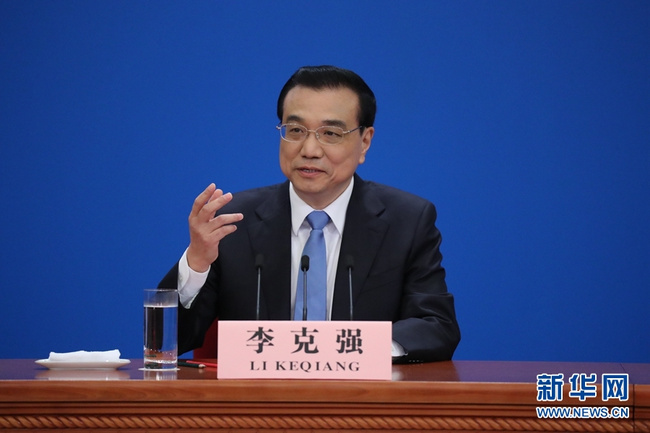Premier Li upbeat in setting out plans for the road ahead

By David Maguire
The tone was upbeat and the mood was convivial as China’s premier, Li Keqiang, presided over the traditional press conference following the end of the annual two sessions of legislative and political advisory meetings by China’s political elite in Beijing.
The premier’s engagement with scores of domestic and foreign reporters contrasted starkly with the combative, almost snarly, anti-media attitude by the new administration in Washington to members of the Fourth Estate.
The media in China was assiduous in its coverage of matters discussed during the fortnight of annual talks in Beijing of the National People’s Congress and the Chinese People’s Political Consultative Conference (CPPCC).
And Premier Li’s press conference was the media management capstone, his role to reaffirm policy and comment on issues that were at the forefront of the ruling party’s immediate and long-term strategies.
Wearing a dark suit and pastel blue tie, he was at the top of his game in the political showcase of the Great Hall of the People, spontaneously bantering with foreign reporters – “Your Mandarin is so good” and “You have great courage to ask all of the question in Chinese.” And he was resolute in staying strongly on message.
Mr. Li presented a positive view of the Chinese economic direction for the year, notwithstanding a gross domestic product (GDP) target of 6.5 percent which is down from 2016’s top-of-the-range goal of 7 percent. The new figure was not low, he said, and would not be easy to meet, adding “it’s time to stop talking about a China economic hard landing.”
The March 15 event was preceded by media coverage of a report by China’s National Bureau of Statistics that listed growth across a number of areas in the first two months of this year: fixed asset investment, up 8.9 percent; private investment, up 6.7 percent; retail sales, up 9.5 percent, foreign trade, up 20.6 percent; and consumer inflation averaging at an acceptable 1.7 percent.
On the Chinese economy, Mr. Li said his big achievement in the role of premier over four years was keeping the growth rate in a reasonable range. And he’d heard too much talk about a ‘hard landing’.
He addressed China-U.S. relations, calling on President Trump to work with China and sending a signal of confidence: “We don’t want to see a trade war breaking out … No matter what bumps this relationship hits, we hope it’ll move forward in a positive direction.” He said there were broad prospects for China-U.S. cooperation.
On regional issues, he did not want to see Southeast Asian countries veering toward a cold war mentality and being forced to pick sides between Beijing and Washington. These neighbors are a diplomatic priority, he said, despite issues over South China Sea territoriality and trade.
Mr. Li issued a sharp warning about the potential for ultimate conflict on the Korean Peninsula (“no-one wants chaos on their doorstep”) and highlighted the need for ongoing economic cooperation between the mainland and Hong Kong where the principle of “one country, two systems” should be “perceived and implemented in its entirety.”
Where China acts with a global mindset on matters such as trade, the environment and cultural and economic development, it can be interpreted as being at odds with the current trend toward protectionism, for example, in the United States.
But it is unrealistic of China to ignore the populist-driven retractions from globalization being promulgated by various states wanting to focus stronger efforts on domestic enhancement at the expense of various cross-border trade and military pacts.
Britain’s retreat from the European Union, a changing of the guard in the White House, moves to the right in European national elections, weakening support for Angela Merkel in Germany and the strengthening influence of Russia all have the potential to disrupt the world order China has been striving to achieve.
Premier Li therefore deemed it necessary in his conference to echo the globalization mantra emphatically espoused by President Xi Jinping at Davos earlier this year. Mr. Li said China will continue to support a united, prosperous and stable European Union and a strong euro. “This is beneficial to a globalized economy, a multipolar world and a diverse human civilization,” he said. And, he added, China will seize any possible opportunity to improve the world economy through a multilateral trading system.
The many issues covered in the press conference were, however, the tip of the iceberg when it came to other matters of city, regional, infrastructure and societal importance adjudicated by delegates to the legislative and political advisory sessions.
Schools will be given greater flexibility in setting class schedules and a study will be launched into the growing problem of school violence, efforts will be intensified to ensure that the quality of goods for domestic consumption matches export standards, and six million sub-standard urban homes will be rebuilt. Public interest lawsuits are also being considered to better protect the public's rights in environmental and food and drug safety issues.
Also, stronger anti-corruption legislation is planned, measures will be devised to curb excessive spending on recruiting foreign sports players, a target has been set for another 11 million new urban jobs, and greater access will be facilitated for people to enjoy the country’s cultural relics.
Premier Li’s press conference was a positive conclusion to an extensive round of policy considerations and strategic planning by the 2,200 consultative members of the advisory CPPCC, and the 3,000 parliamentary delegates of the ruling CPC.
· Dr. David Maguire is a regular radio and online commentator for China Radio International.






